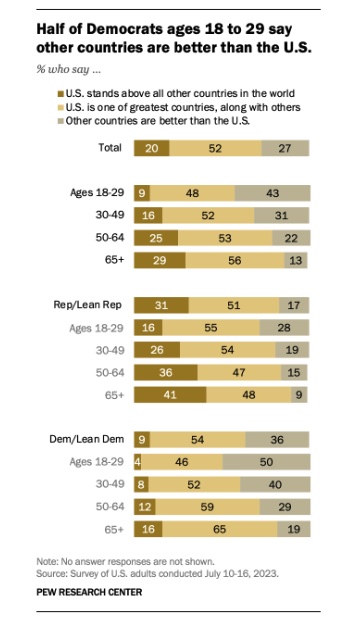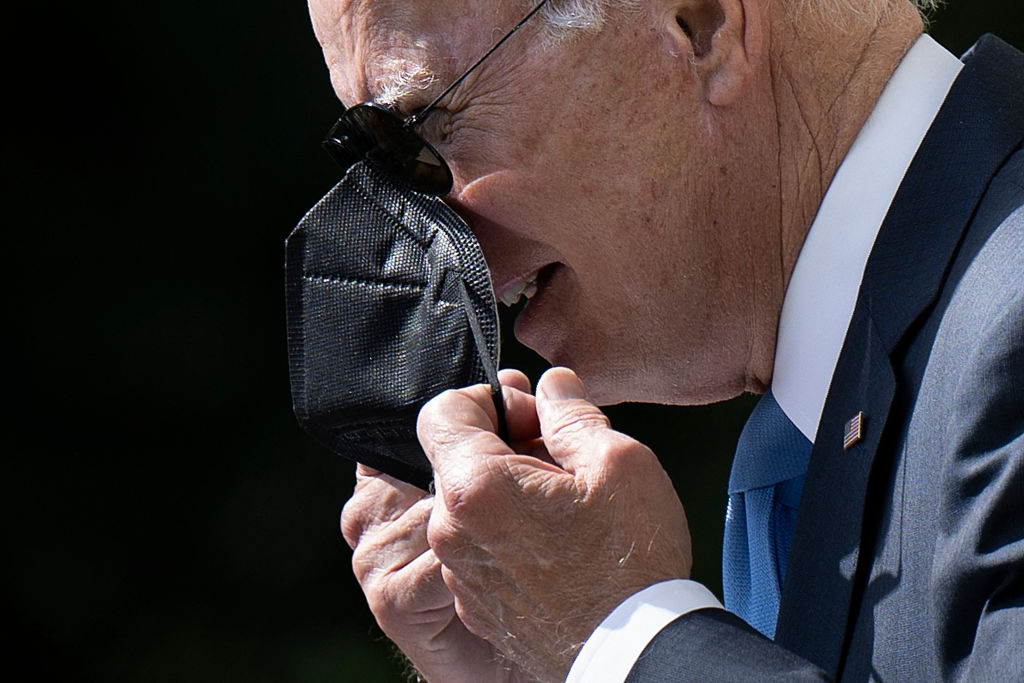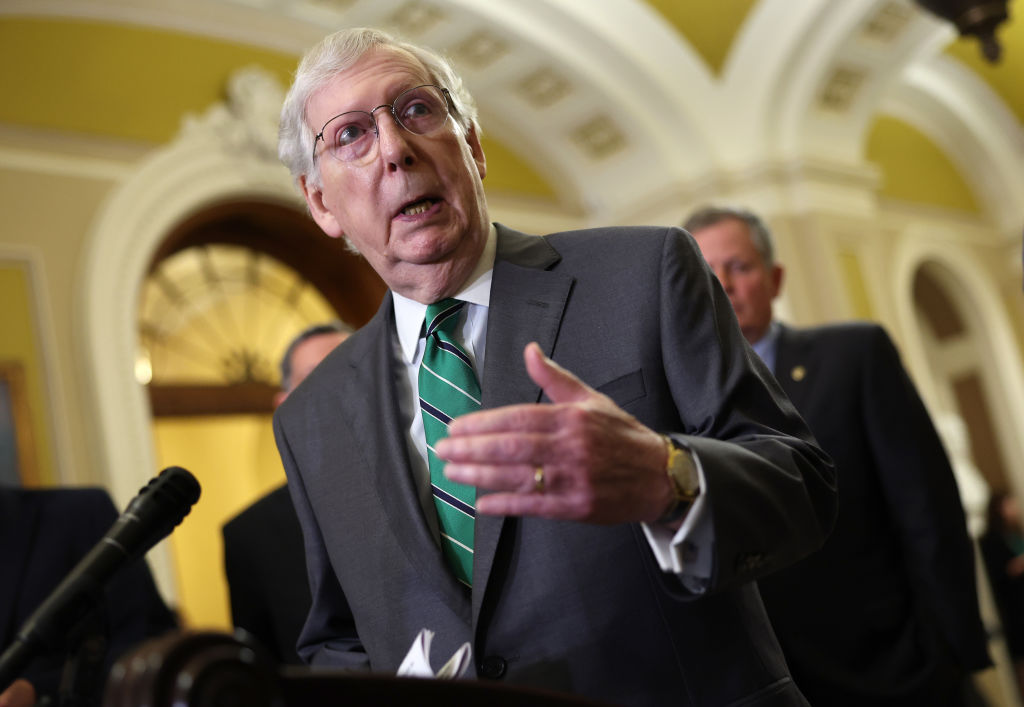Given the age of the American electorate, it shouldn’t be surprising that our leaders are older than the general population.
The average age of a registered voter in 2020 was 50, six years older than it was in the mid-1990s, and 12 years older than the nation as a whole. Even remembering that minors can’t vote, our electorate skews senior, especially when we start thinking about likely voters as opposed to just eligible voters.
As a rough rule of thumb, the turnout percentage for an age group is usually about equal to the numerical age of its members. About 40 percent of 40-year-olds vote, 50 percent of 50-year-olds, 60 percent of 60-year-olds and so on.
Population booms can mute the impact of this trend in favor of younger voters, but only up to a point. If more than half of voters are in their golden years, we would expect to see elderly people overrepresented in our political class.
But this is ridiculous …
Like the Gen Xers trying to balance childcare for their kids and eldercare for their parents, the median American voter finds herself caught between concerns about the infirmity and wackiness of aged leaders and the callowness and radicalism of younger ones. On the narrow fulcrum of voters born between 1965 and 1980 tips the scales between two unappealing extremes.
Time will resolve these issues in two ways. Older voters will go on to the great caucus room in the sky, and radical young voters will become middle-aged moderate ones. Then they’ll be the ones who get to complain about cranky Xers and impractical twentysomethings. But here, at the point of maximum tension between the very old and very young, things are getting wobbly.
Senate Minority Leader Mitch McConnell is struggling. How much he is struggling to do the actual work he has mastered in his decades of office we don’t know. His public struggle, however, is undeniable. After the second episode in which the 81-year-old Kentuckian froze, his face an unnerving rictus, during a press conference, Senate Republicans are deeply worried about their longtime leader. If you have President Joe Biden vouching for your mental acuity in advanced years, it’s not a good sign.
The problem for Republicans is that there’s never a convenient time to have a leadership change. But some times are worse than others.
With Congress coming back later this month facing a slate of must-pass-legislation and a Republican House majority prepared to start an impeachment inquiry into Biden, this would not be a good time for choosing a new leader.
But how about in three months? If McConnell stays in his position but has another episode this fall or winter, it casts into doubt his party’s strategy to win back the Senate, especially in what could be a difficult climate for the GOP. McConnell has been a one-man political machine for more than a decade, keeping Republicans competitive in key Senate races by recruiting viable candidates and, with mixed success, keeping bad ones off the ballot.
Aside from his health struggles becoming a campaign issue themselves—muddling Republicans’ attacks on Biden’s age and infirmity as they do—his capacity to attract or repel recruits and remain a credible threat to keep order in the increasingly Cruz-like Senate is already much attritted.
Former House Speaker Nancy Pelosi, McConnell’s frequent foe and sometimes partner, has already shown him an exit strategy. She stepped aside as Democratic leader, paving the way for Rep. Hakeem Jeffries of New York, but remains in Congress to provide counsel, assurance, and institutional memory. She soothed the old bulls who worried about a change and provided a check on young upstarts. Rather than undercutting Jeffries, she has provided him a softer launch.
Through so many populist attacks and Trump outrages, conservatives have taken much comfort in the reassuring presence of McConnell. They have known that his time in power is passing. Now they—and he—have to decide whether to try to shape that moment, or to gamble on where the wild winds of an election year will blow them.
The difficulty of that choice explains a lot about the extraordinary age of so many of our leaders. With the scales weighted at the extremes between the very young and very old in our electorate, the middle way of middle age proves hard to find.
Holy croakano! We welcome your feedback, so please email us with your tips, corrections, reactions, amplifications, etc. at STIREWALTISMS@THEDISPATCH.COM. If you’d like to be considered for publication, please include your real name and hometown. If you don’t want your comments to be made public, please specify.
STATSHOT
Biden Job Performance
Average approval: 41.6%
Average disapproval: 53.0%
Net score: -11.4 points
Change from one week ago: ↑ 0.8 points
Change from one month ago: ↑ 0.6 points
[Average includes: Emerson: 43% approve-47% disapprove; Fox News: 42% approve-58% disapprove; Marist: 42% approve-52% disapprove; Quinnipiac: 39% approve-55% disapprove; Gallup: 42% approve-53% disapprove]
Polling Roulette

TIME OUT: INSIDE BASEBALL
Smithsonian: “On December 18, 1944, a 42-year-old man masquerading as a Swiss physics student settled his 6-foot-1 frame into a chair in a Zurich lecture hall. … The man was trying to understand enough of the scientist’s native German to identify key words—words that could change, or perhaps even destroy, the world. … The audience member was no ordinary student. In fact, he wasn’t a student at all. He was a retired baseball player named Morris ‘Moe’ Berg, and the American government wanted him to assassinate a man dubbed ‘the most dangerous possible German in the field’ of physics: Werner Heisenberg, director of the Nazi nuclear program. … An average-at-best catcher who played well past his prime, Berg joined the Office of Strategic Services (OSS), a precursor to the CIA, in 1943. Nicknamed the ‘brainiest man in baseball’ due to his knack for languages and quick wit, he found himself behind enemy lines five years after he hung up his cleats for the last time.”
SINKHOLE? DESANTIS’ PAC MAN WANTS ANOTHER $50 MILLION
New York Times: “Hours before the Republican Party’s first presidential debate, the chief strategist for the super PAC that has effectively taken over Ron DeSantis’s presidential campaign met with donors in Milwaukee. ‘Now let me tell you a secret—don’t leak this,’ the strategist, Jeff Roe, told the donors last Wednesday, according to a recording of the meeting reviewed by The New York Times. … ‘The day after Labor Day we’re launching and we need your help to stay up and go hard the rest of the way. We need 50 million bucks.’ … Mr. Roe told the donors he required much of the $50 million in the next month before the second G.O.P. debate on Sept. 27. He said he needed $5 million a month just to sustain his Iowa operations. And he said Mr. DeSantis needed to beat Donald J. Trump in ‘the next 60 days’ and separate from all of his other rivals ‘now.’”
Pence sees fundraising boost after feisty debate: Politico: “Mike Pence is getting a second look from some GOP donors following his uncharacteristically combative performance in last week’s debate. At a Monday fundraiser hosted by the oil tycoon Forrest Lucas, the former vice president raked in $250,000—one of his largest single-event fundraising hauls since announcing his campaign in June. … In a memo to donors following the debate, Pence campaign manager Steve DeMaura wrote that even after weathering two years of attacks from Trump, ‘Our strategy is not sexy. It does not take $150 million today. And does not involve trying to be a Trump clone or single-mindedly running to repudiate him.’ … Pence’s allied super PAC, Committed to America, also saw a spike in fundraising. The PAC saw an additional $250,000 flow in the day after the debate.”
Kemp quashes effort by Georgia GOP to meddle in Trump case: The Hill: “Georgia Gov. Brian Kemp (R) on Thursday dismissed the idea of calling a special legislative session to oust Fulton County District Attorney Fani Willis (D) over her case against former President Trump. … ‘A special session … would ignore current Georgia law and directly interfere with the proceedings of a separate but equal branch of government,’ he said during a press conference. … Kemp said history was ‘trying to repeat itself,’ referring to the time shortly after the 2020 election when he dismissed calls to order a special session to overturn the election results. … A handful of Republican state lawmakers have joined [state Sen. Colton Moore’s] call for a special session to impeach or defund the elected prosecutor’s office.”
Trump’s Georgia hearings will be televised: Atlanta Journal-Constitution: “A Fulton County judge … said that all court proceedings in the election interference case against former President Donald Trump and 18 co-defendants will be live streamed and televised. Judge Scott McAfee also said … all hearings and trials will be broadcast on the Fulton County Court YouTube channel. In an order issued Thursday, McAfee said members of the media would be allowed to use computers and cellphones inside the courtroom for non-recording purposes during court proceedings. There will be pool coverage for television, radio and still photography.”
New Hampshire GOP splits over effort to disqualify Trump: Politico: “New Hampshire Republicans have erupted in a feud over a longshot effort to keep former President Donald Trump off the ballot in 2024, with the chair of the state GOP insisting Monday that the frontrunner for the party’s nomination will be included. … Some legal scholars and Trump critics have long argued the former president should be disqualified from the ballot under Section 3 of the 14th Amendment… But the dispute is taking off in New Hampshire, where Bryant ‘Corky’ Messner, an attorney who ran on Trump’s endorsement as Republicans’ 2020 U.S. Senate nominee, is questioning Trump’s eligibility for the ballot—and wants to see the courts address it. … The uproar in New Hampshire comes as the filing deadline to appear on the primary ballot nears.”
SHADOW PRIMARY TO SUCCEED BIDEN ALREADY UNDERWAY
Wall Street Journal: “High-profile Democratic governors are stumping for President Biden’s 2024 re-election campaign and simultaneously auditioning to become the party’s next standard-bearer. Their efforts signal they are unlikely to cede that role in 2028 to Vice President Kamala Harris. … California Gov. Gavin Newsom has toured red states such as Idaho, Mississippi, Arkansas and Alabama to campaign for Biden. … Maryland Gov. Wes Moore raised money for Democratic governors on the sidelines of the annual Allen & Co. Sun Valley Conference in July [and] offered a televised response to the first GOP debate. … Pennsylvania Gov. Josh Shapiro will travel to New Hampshire next month for a keynote address to the state Democratic Party’s convention. … Some Democrats privately say that should an unexpected health scare derail Biden’s re-election campaign, many high-profile Democrats, including governors and members of Congress, would consider getting in the 2024 race alongside Harris.”
W.H. wants emails between Biden’s veep office, Hunter’s firm kept secret: New York Post: “Hunter Biden’s Rosemont Seneca Partners investment firm traded more than 1,000 emails with Joe Biden’s office during his time as vice president—and hundreds remain hidden because of executive privilege asserted by the White House, documents released by the National Archives show. The 861 emails that reference Rosemont Seneca were sent or received by the Office of the Vice President between January 2011 and December 2013, according to America First Legal, which obtained the messages from the National Archives and Records Administration … The White House refused to allow the release of 200 emails referencing Hunter Biden’s firm, citing executive privilege. ‘Release would disclose confidential advice between the President and his advisors, or between such advisors,’ NARA informed America First Legal in response to its records request.”
Dems fret over party’s dysfunction in battleground Pennsylvania: Politico: “In anticipation of a major gathering of rural activists a few weeks ago, the Pennsylvania Democratic Party printed out thousands of cards reminding voters to ‘Vote at Polls: Election Day Tuesday November 8.’ There was just one small problem: Election Day is Nov. 7. Pictures of the mess-up were shared among Democratic insiders around Pennsylvania. It was, to many of them, the latest sign of a state party in chaos. With a little more than a year to go until the 2024 election, the state Democratic Party is reeling from financial problems and a lack of trust across the party, according to interviews with 20 Democratic officials and operatives throughout Pennsylvania. They include elected officials, county chairs, state committee members, former state party employees and strategists. ‘It’s amateur hour,’ said a state committee member who, like other Democrats, was granted anonymity to speak frankly about a sensitive matter.”
BRIEFLY
Low correlation between partisan control and crime levels—New York Times
Blake Masters, Kari Lake primed for MAGA showdown in Arizona Senate primary—Wall Street Journal
Former GOP Rep. Mike Rogers will launch Michigan Senate bid—Detroit News
Dobbs looms large in November’s Pennsylvania Supreme Court race—Politico
Wisconsin GOP may seek to impeach newly elected justice—Milwaukee Journal-Sentinel
Miami mayor drops presidential bid without a ripple—Miami Herald
WITHIN EARSHOT: HOW THE TURNTABLES
“Of all the Democratic candidates out there, why should I vote for the one with the least political experience?”—Vivek Ramaswamy, then a Harvard undergraduate, questions why Reverend Al Sharpton is qualified to be the 2004 Democratic nominee for president during an October 2003 edition of MSNBC’s Hardball.
MAILBAG
“What can explain the evangelicals’ favorability preference for Trump and DeSantis over [South Carolina Sen. Tim Scott]? I don’t know much about DeSantis and his faith, but I was at Liberty University on the day Donald Trump attempted to teach us all from ‘Two Corinthians’ in convocation. Clearly not a man who has spent much time in the Bible or a church for that matter. And yet Tim Scott leads with his faith. He seems to know scripture and applies it to his campaign and his life is reflective of what he believes. What is the point of being an Iowa evangelical if you reject the very teachings and example of Jesus in your candidate and instead gravitate toward a twice (or is it thrice?) divorcée who has routine sex with porn stars, lies without a thought, doesn’t know the meaning of turn the other cheek and to top it off, is charged with a bajillion felonies? It’s all too much!”—Katie Hacker, Evington, Virginia
An evergreen question for our political age, Ms. Hacker! Much of this is semantic. What theologians, pollsters, and voters mean by “evangelical” are very different things. Here’s what I wrote a couple of years ago about the demise of the term as a useful political marker: “The new Pew research, the continuing decline in church attendance among self-professed Evangelicals, and the growth of what [David French] aptly describes as ‘angry Christian nationalism,’ all point to the same conclusion: the term Evangelical has lost its salience as a term to describe religious practice. At the very least, the term has ceased to mean what [Billy Graham] & Co. intended. Increasingly, it’s just another way to say ‘politically conservative,’ a grouping we already use.” I have written also about the problem this poses for the church in America, which is a matter of considerably more concern. Parties rise and fall, but the ways in which politics poison matters of faith relate to the things eternal. The necessity of keeping matters of church and state separate is, yes, to keep the government from using faith to extend its power. But it is also necessary because political power corrupts faith and distorts the most intimate, sacred part of our lives.
“A popular thesis is ‘who cares about national polls, this thing comes down to the same seven states as 2020 with Wisconsin (can pick another, but this is my favorite proxy) being the one most likely to decide the race’ … With that said, it might be worth considering adding some sort of swing state polling/mood coverage to the STATSHOT key metrics section. I know it’s pretty early on for head-to-head polls in these states.” —Tim Semones, Ketchum, Idaho
Good points, Mr. Semones! As we move beyond Labor Day and the Republican nominating contest intensifies, we will indeed be adding more data on voter attitudes in the early states. You are quite right that it is too early to be thinking about general election polls in swing states—without the nominees yet set and with persuadable voters far away from making choices—but we will also be looking for measurements of sentiment in those places. But I would remind you that what makes those states competitive is that they tend to reflect national opinion, with a slightly less Democratic skew. In an evenly divided nation, it’s the states closest to the median that get to do the choosing.
“I’ve got a comparison for how people interact with politics and cover it. I want your opinion on whether I am off base. Politics is often compared to sports, yet it mirrors a very particular one: college football. Peruse the pages and channels of various media. You’ll find people who don’t work for a party, politician, or a movement/organization. Yet, those individuals deliver the talking points of those entities. College football has the same dynamic. Writers for newspapers and talkers on TV and radio disseminate the positions of colleges and conferences, even though they do not work for those institutions in any official capacity. In both college football and politics, pundits know who their audience is and what they want to hear, so they naturally skew what they say to that reality. Often, this means never ruffling the feathers of the biggest brands and most influential groups. Unfortunately, this means much of what you hear in both areas is stuff that the person saying it does not believe. Many of college football’s fans want what political junkies do. The media ecosystem of both college football and politics seems designed to give its target the same thing. Both groups seem to interact with those areas in a very similar way. Am I off base?”—Collin Rusk, Birmingham, Michigan
Hardly, Mr. Rusk! You’re, ahem, right in the end zone. If you’ll pardon my shameless self-promotion, I wrote a lot about that parallel in my book, Broken News. The parallel between political and sports media is very clear, down to the ways in which the end of stable, mainstream media consumption has intensified partisanship. We can always hear the home team’s spin: “Now that I can have the coverage I want for almost every game, the national broadcasting crews sound even more biased to my ear than before. Since I have flattering coverage at my fingertips, even scrupulous fairness sounds like over-the-top bias to me. That’s why it’s helpful to the bottom line of news outlets to spend so much time dumping on the coverage from competitors: It’s to keep their own consumers satisfied. Given how relatively little crossover there is between audiences for left-leaning and right-leaning outlets, news organizations may feel the need to remind their consumers just how bad it is out there. When contrasted with the home-team advantage for politicians of their audience’s preference, the other news outlets seem even more outrageously biased. The message is so powerful because of our innate tendencies to attribute the mistakes in others to wickedness and to automatically assume even fair coverage is slanted against our side.”
You should email us! Write to STIREWALTISMS@THEDISPATCH.COM with your tips, kudos, criticisms, insights, rediscovered words, wonderful names, recipes and, always, good jokes. Please include your real name—at least first and last—and hometown. Make sure to let me know in the email if you want to keep your submission private. My colleague, the autumnally inclined Nate Moore, and I will look for your emails and then share the most interesting ones and my responses here. Clickety clack!
CUTLINE CONTEST: FULLY ARMED AND OPERATIONAL

A great crop of entries for our cutline harvest this week! But our winner was the one that managed to use the power of the Dark Side, but for good …
“Now … the Force will be with me!!”—Mary Stine, Prairie Village, Kansas
Winner, ‘Missed it by That Much’ Division:
“Agent KN-95 contacts CONTROL on the mask-phone.”—Linda McKee, DuBois, Pennsylvania
Winner, No Malarkey Division:
“Zients, get over here! There is literally no ice cream in this cone! No hyperbole! Not a joke!”—Paul Hoppenjans, Leesburg, Virginia
Winner, Double Dipper Division:
“Ah, the smell of chocolate chip ice-cream breath.”—Timothy Hubbard, Tuscaloosa, Alabama
Winner, *urp* Division:
“Yeap, this definitely smells like Hunter’s mask.”—Kirk Dunn, Yuma, Arizona
Winner, Grunge Division:
“Smells like teen spirit.”—M.K. Zeppa, Pearisburg, Virginia
Winner, Christopher Nolan Division:
“With this mask, Dark Brandon becomes even darker.”—Richard Basuk, New York, New York
Winner, ‘How do you do, Fellow Kids’ Division:
“With this cool disguise I bought on Amazon I will be able to walk down the Main Streets of America unnoticed and find out what’s going on with the average Joe.”—Kevin Cook, Fort Worth, Texas
Send your proposed cutline for the picture that appears at the top of this newsletter to STIREWALTISMS@THEDISPATCH.COM. We will pick the best entrants for each week and an appropriate reward for the best of this month—even beyond the glory and adulation that will surely follow. Be hilarious, don’t be too dirty, and never be cruel. Include your full name and hometown. Have fun!
‘COMPETITIVE MULLET’
UPI: “A Tennessee woman who hasn’t cut the hair on the back of her head since 1990 earned the Guinness World Record for the longest competitive mullet. Tami Manis earned the female version of the mullet length record when the ‘party in the back’ part of her hair was measured at 5 feet, 8 inches long. Manis said she keeps the front and sides of her hair short but hasn’t cut the back since Feb. 9, 1990. She said she grew a mullet when she was young, inspired by a girl in Til Tuesday’s ‘Voices Carry’ video, and immediately regretted cutting it off in 1989. ‘The weirdest thing I find is that people remember me from years ago,’ Manis said. ‘I’ve had people recognize me from 20 years ago because I’ve kept the same hairstyle.’ Manis took second place in the ‘femullet’ category at the 2022 U.S. Mullet Championships, earning her a $300 prize.”
Chris Stirewalt is a contributing editor at The Dispatch, a senior fellow at the American Enterprise Institute, the politics editor for NewsNation, co-host of the Ink Stained Wretches podcast, and author of Broken News, a book on media and politics. Nate Moore contributed to this report.









Please note that we at The Dispatch hold ourselves, our work, and our commenters to a higher standard than other places on the internet. We welcome comments that foster genuine debate or discussion—including comments critical of us or our work—but responses that include ad hominem attacks on fellow Dispatch members or are intended to stoke fear and anger may be moderated.
You are currently using a limited time guest pass and do not have access to commenting. Consider subscribing to join the conversation.
With your membership, you only have the ability to comment on The Morning Dispatch articles. Consider upgrading to join the conversation everywhere.